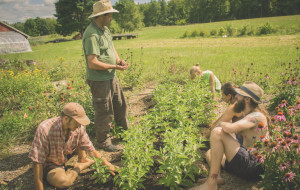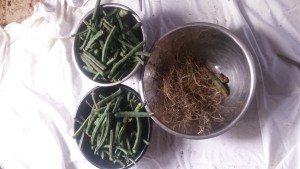The field of herbalism is kind of wide open with no parameters limiting it. Becoming an herbalist who effectively helps clients is easier with practice, training, and holistic understanding
A person is a body-heart-mind-spirit continuum, and to separate out mental from emotional or spirit from body and give them to different specialists is all well and good, as long as each one of them also has an understanding of the totality. Unfortunately, that is not always the case.
If you are interested in becoming an herbalist, it is really important to get some kind of study, practice, or certification in a mind or counseling modality, whether it’s in social work or the broad field of psychology or some certification in talk therapy or cognitive therapy. 
In addition to becoming savvy and competent in the actual world of herbs (meaning medicines from the Earth), helping people with their physiological symptoms and maladies to feel better or to keep them well is equally important. This includes being able to sit with people and help them understand what’s going on in their minds and hearts and how it affects the body. These experiences and issues always involve the nervous system. We know psychosomatic illness and stress account for many illnesses and can depress physiological functions, including the immune system.
If you can’t meet your client in a safe, non-judgmental way with really good listening and speaking skills, with an understanding of how the mind works and how psychology works, then you’re going to be limited in how much you can help. You’re not going to be as good a listener and sounding board for the person in front of you, even for the physical stuff, because it will be difficult for you to meet them where they are.
Considering physical components used in becoming an herbalist
The body also needs help from a physical point of view. This is not just you making suggestions for their food, nutrition and their herbs, but also hands-on body or energy work.
Some kind of training in bodywork, massage, or energetic touch therapy like Reiki or cranio-sacral therapy is a good idea. Any of the kinds of hands-on body work, whether it’s straight up Western massage or Asian massage would be very good skills to have under your belt. Some people even get trained in acupuncture to do needling.
So then you have this three-part system (herbal medicine, counsel, body work) for helping people, and it may also help you in a court of law, because these other modalities often have licensing to go along with them. Herbalism is not a licensed health modality in the US or Canada. If somebody asks, ”Do you have a license to be able to speak to somebody about their issues or to work on their body?” You can say, “Yes, I have a social work degree”, or, “I have training in this kind of talk therapy,” or, “I am a licensed body worker.” That will help a lot.
Becoming an herbalist is benefited by using more than one lens
If you want to be an effective herbalist, it would be wise to have more than one healing modality, or lens, with which to view people.
I teach mostly Westerners and English-speaking people. As Westerners, we are all hardwired with an allopathic understanding of health. Whether or not you’re savvy in anatomy and physiology, you probably can name most of the organ-systems in the human body from a Western point of view. You’re probably also capable of naming many illnesses and issues that can occur to each of those organ-systems. Besides allopathy, the Western health paradigm also includes Western-based holistic medicine as well as older Western healing modalities that have been left behind by modern medicine. There is a reason we have the saying, “Throwing the baby out with the bath water.” It is hubris to think that what we know now is best and everything before therefore deemed obsolete and jettisoned. Fortunately, we have texts and treatises from older times, where we can rediscover and reintegrate valuable wisdom from the past with our newer understanding.
In addition to the Western health paradigm, I strongly recommend picking up at least one, possibly two more health lenses, like Ayurveda, Chinese, Tibetan, or any of many indigenous healing modalities. All of these have qualitatively different lenses for looking at human health, and having more than one viewpoint gives us more capacity to understand what is going on and how to help.
Using multiple lenses allows you to have broader skills to see and understand people and health better. There are many things that we don’t see that the Chinese see very clearly, and there are situations where the Chinese may get tied down a little bit and the West can offer a more effective healing strategy.
Chris Marano, Director of Clearpath School of Herbal Medicine, has training in Western holism and allopathy as well as Chinese medicine and First Nation/Native American medicine (Cherokee and Anishinaabe-Ojibwe).
Interested in becoming an herbalist?
The first online herbal medicine course from Clearpath School of Herbal Medicine — the Foundations of Western Herbalism, Part 1 — begins with a systematic and comprehensive exploration of human beings and health through the lenses of traditional Western/European and First Nations/Native American healing modalities while also interweaving with contemporary scientific and medical understanding.
Learn more about this online herbalist course here. You can watch an introductory video and take a deeper look at the information you will learn from this course.


Trackbacks/Pingbacks